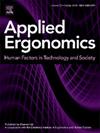Digital technologies, sustainability, and work: How can these themes be brought together to promote a human-centered future in industry 5.0 implementation?
IF 3.4
2区 工程技术
Q2 ENGINEERING, INDUSTRIAL
引用次数: 0
Abstract
The concept of Industry 5.0 underscores the societal importance of aligning digital technologies, human centrality (including work), and sustainability within production systems. However, its practical implementation faces significant challenges. Considering the central role of work in production systems as envisioned by ergonomics, this study addresses the following research question: What is the role of work, and how can it contribute to ensuring that technology-intensive production systems align with the principles of Industry 5.0, making them human-centered, sustainability-driven, and resilient? In this context, the objective of this research is (i) to map scientific contributions that connect digital technologies, sustainability, and work in production systems, (ii) to investigate gaps and opportunities in scientific literature and possible contributions related to the discipline of ergonomics and (iii) propose theoretical and practical implications. To this end, a systematic literature review was conducted in the Scopus database, aiming to identify studies that connected the three themes. A final sample of 115 articles was obtained, which served as the basis for a content analysis. The results revealed scientific contributions linking digital technologies and work within the context of sustainable development and corporate sustainability. The study also identified seven groups of papers (technology improvement, competent workers, interaction, expanded capabilities, work management, training and embodying) focusing on the intersection of work and digital technology, specifically, ways in which technology influences work/worker and vice versa. Future studies are called to deepen the theoretical concept of Industry 5.0; develop tools, frameworks and indicators; develop more empirical studies; focus more on the role of the worker; and develop solutions to monitor the impacts of technology on work overtime. This study also reinforces the potential of using the discipline of ergonomics as theoretical background to leapfrog knowledge for this research agenda. This is because this discipline has been already developing knowledge on the connection between work and sustainability towards different lines of research that can also be applied in the context of production systems with intensive use of digital technologies. Based on this, theoretical implications for researchers and practical implications for organizations and policymakers were defined, aiming to build human-centered and sustainable production systems.
数字技术、可持续性和工作:如何将这些主题结合起来,在工业 5.0 实施过程中促进以人为本的未来?
工业5.0的概念强调了在生产系统中协调数字技术、以人为中心(包括工作)和可持续性的社会重要性。然而,其实际实施面临着重大挑战。考虑到人体工程学所设想的工作在生产系统中的核心作用,本研究解决了以下研究问题:工作的作用是什么?它如何有助于确保技术密集型生产系统与工业5.0的原则保持一致,使其以人为本,可持续发展驱动,并具有弹性?在此背景下,本研究的目标是(i)绘制连接数字技术、可持续性和生产系统工作的科学贡献图,(ii)调查科学文献中的差距和机会,以及与人体工程学相关的可能贡献,(iii)提出理论和实践意义。为此,我们在Scopus数据库中进行了系统的文献综述,旨在找出与这三个主题相关的研究。最终获得115篇文章的样本,作为内容分析的基础。结果显示,在可持续发展和企业可持续发展的背景下,数字技术和工作之间的科学贡献。该研究还确定了七组论文(技术改进、有能力的工人、互动、扩展能力、工作管理、培训和体现),重点关注工作和数字技术的交叉,特别是技术影响工作/工人的方式,反之亦然。未来的研究需要深化工业5.0的理论概念;制定工具、框架和指标;开展更多的实证研究;更多地关注工人的角色;并制定解决方案,监测技术对加班的影响。这项研究也加强了利用人体工程学作为理论背景的潜力,以跨越这一研究议程的知识。这是因为这门学科已经发展了关于工作与可持续性之间的联系的知识,朝着不同的研究方向发展,这些知识也可以应用于大量使用数字技术的生产系统。在此基础上,明确了构建以人为本的可持续生产系统对研究者的理论启示和对组织和决策者的实践启示。
本文章由计算机程序翻译,如有差异,请以英文原文为准。
求助全文
约1分钟内获得全文
求助全文
来源期刊

Applied Ergonomics
工程技术-工程:工业
CiteScore
7.50
自引率
9.40%
发文量
248
审稿时长
53 days
期刊介绍:
Applied Ergonomics is aimed at ergonomists and all those interested in applying ergonomics/human factors in the design, planning and management of technical and social systems at work or leisure. Readership is truly international with subscribers in over 50 countries. Professionals for whom Applied Ergonomics is of interest include: ergonomists, designers, industrial engineers, health and safety specialists, systems engineers, design engineers, organizational psychologists, occupational health specialists and human-computer interaction specialists.
 求助内容:
求助内容: 应助结果提醒方式:
应助结果提醒方式:


